Battle of Qiqihar
Contributor: C. Peter Chen
ww2dbaseIn response to the Japanese occupation of northeastern China, Heilongjiang provincial governor Ma Zhanshan, desite orders to avoid direct confrontation, chose to hold the Nenjiang Bridge over the namesake river, Nen, near the town of Jiangqiao. The bridge had already been heavily damaged in previous fighting between Nationalist and Communist forces. On 4 Nov, a Japanese repair crew escorted by 800 troops attempted to repair the bridge when 2,500 of Ma's troops appeared. While it was not known who fired the first shot, the two sides fought across the span of the bridge for hours; casualties were light, 15 Japanese and 120 Chinese killed. Unable to push back the Japanese despite numerical superiority, Ma ordered his troops to fall back to organize a counterattack, which failed to recapture the bridge. Although Ma ultimately gave up on the attack after the Japanese reinforced with tanks and field guns, he would be lauded as a symbol of resistance against Japanese aggression.
ww2dbaseOn 15 Nov 1931, Japanese troops began to threaten Ma's headquarters at Qiqihar, Nenjiang Province, China; offered a chance to surrender, Ma turned it down. On 17 Nov, 3,500 Japanese troops under General Jiro Tamon attacked, engaging Chinese defenses at the village of Sanjianfang in sub-zero temperature, penetrating the defensive line before nightfall. To preserve his strength, Ma began evacuating Qiqihar on 18 Nov, forming a new defensive position at Baiquan and Hailun to the east by 19 Nov, holding there for some time before falling back again.
ww2dbaseSource: Wikipedia.
Last Major Update: Jun 2012
Photographs
 |  |
Battle of Qiqihar Timeline
| 4 Nov 1931 | Chinese forces under General Ma Zhanshan of Heilongjiang Province attacked a group of Japanese troops at Nenjiang Bridge. Despite numerical advantage, Japanese artillery and light tanks drove off the Chinese attacks by inflicting heavy casualties. |
| 15 Nov 1931 | Chinese General Ma Zhanshan of Heilongjiang Province rejected the Japanese ultimatum. |
| 17 Nov 1931 | Japanese troops attacked Qiqihar, Nenjiang Province, China. Chinese troops, out-gunned, attempted to hold defensive lines against Japanese artillery bombardment and cavalry charges. |
| 18 Nov 1931 | Chinese troops under General Ma Zhanshan withdrew from Qiqihar, Nenjiang Province, China. |
| 19 Nov 1931 | Chinese General Ma Zhanshan evacuated to Hailun, Heilongjiang Province, China, establishing new defensive positions at Hailun and Baiquan. Behind his troops, Japanese troops captured the city of Qiqihar, Nenjiang Province where Ma had withdrew from on the previous day. |
Please consider supporting us on Patreon. Even $1 per month will go a long way! Thank you. Please help us spread the word: Stay updated with WW2DB: |

» Ma, Zhanshan
Location:
» China
- » 1,181 biographies
- » 337 events
- » 45,115 timeline entries
- » 1,248 ships
- » 350 aircraft models
- » 207 vehicle models
- » 376 weapon models
- » 123 historical documents
- » 261 facilities
- » 470 book reviews
- » 28,412 photos
- » 365 maps
James Forrestal, Secretary of the Navy, 23 Feb 1945